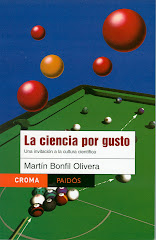by Martín Bonfil Olivera
Published on Milenio Diario, March 18, 2009

In view of Bernard Madoff's financial fraud scandal (not really a "pyramid", because it did'nt have levels; it was a "Ponzi scheme", since Maddoff was in direct contact with all his victims) one could ask wheter similar cases happen in science.
In his classic book The demon haunted world, astronomer and science writer Carl Sagan explains that "science requires the free interchange of ideas; its values are opposed to secrecy."
Values that, he adds, that it shares with democracy.
Such a system is necessarily based on trust. And where there's trust, there can be fraud. Last Thursday, in this same space, mi friend Horacio Salazar talked about how a single dishonest scientist can place at risk a whole area of science (in this case, algiology, the study of pain, where it was discovered that at least 21 research articles by Scott Reuben, a renowned anesthesiologist, contained fake data).
Although science has some quality control mechanisms, such as the peer review process all articles undergo before being published, it's impossible to check every minute detail. And since the evaluation and salary system for researchers demands as many articles as possible ("publish o perish"), the temptation —and the opportunity— for frauds is always at hand.
On the same Thursday, scholar Wietse de Vries, from Puebla's Autonomous University reflects in Milenio Campus supplement about the similarity between the "academic publication industry", based on trust, with a Ponzi scheme (named after Charles Ponzi, the Italian immigrant that discovered how easy it was make frauds thanks to the trust of his fellow citizens and the rules of the financial system, which allows people to get rich not with money, but with the promise of money, as explained by Carlos Mota also on Thursday on Milenio.
Researchers, de Vries explains, write articles which are evaluated by their colleagues (and vice versa); then these colleagues quote, in their own articles, the articles they've reviewed. The system rewards publications and quotes: the more there are, the more benefit for everyone involved.
I'm not sure whether de Vries's analogy is well founded, but it wouldn't do any harm for scientists to review —they're already doing it— their evaluation and fraud control systems.
(Figure: taken from PhD Comics, Jorge Cham's great comic strip about graduate student life)
(translated by Adrián Robles Benavides)
To receive Science for pleasure weekly
in your email, subscribe here!




No comments:
Post a Comment